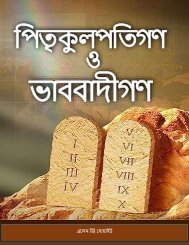Finishing the Race
Of all the games instituted among the Greeks and the Romans, the races were the most ancient and the most highly esteemed … The contests were governed by strict regulations, from which there was no appeal. Those who desired their names entered as competitors for the prize had first to undergo a severe preparatory training. Harmful indulgence of appetite, or any other gratification that would lower mental or physical vigour, was strictly forbidden. For one to have any hope of success in these trials of strength and speed, the muscles must be strong and supple, and the nerves well under control. Every movement must be certain, every step swift and unswerving; the physical powers must reach the highest mark.
Of all the games instituted among the Greeks and the Romans, the races were the most ancient and the most highly esteemed … The contests were governed by strict regulations, from which there was no appeal. Those who desired their names entered as competitors for the prize had first to undergo a severe preparatory training. Harmful indulgence of appetite, or any other gratification that would lower mental or physical vigour, was strictly forbidden. For one to have any hope of success in these trials of strength and speed, the muscles must be strong and supple, and the nerves well under control. Every movement must be certain, every step swift and unswerving; the physical powers must reach the highest mark.
Create successful ePaper yourself
Turn your PDF publications into a flip-book with our unique Google optimized e-Paper software.
him instruction, Daniel says: "My comeliness was turned in me into corruption, and I<br />
retained no strength." Daniel 9:18, 15,20; 10:8.<br />
When Job heard <strong>the</strong> voice of <strong>the</strong> Lord out of <strong>the</strong> whirlwind, he exclaimed: "I abhor<br />
myself, and repent in dust and ashes." Job 42:6. It was when Isaiah saw <strong>the</strong> glory of <strong>the</strong><br />
Lord, and heard <strong>the</strong> cherubim crying, "Holy, holy, holy, is <strong>the</strong> Lord of hosts," that he cried<br />
out, "Woe is me! for I am undone." Isaiah 6:3, 5. Paul, after he was caught up into <strong>the</strong> third<br />
heaven and heard things which it was not possible for a man to utter, speaks of himself as<br />
"less than <strong>the</strong> least of all saints." 2 Corinthians 12:2-4, margin; Ephesians 3:8. It was <strong>the</strong><br />
beloved John, who leaned on Jesus' breast and beheld His glory, that fell as one dead before<br />
<strong>the</strong> feet of <strong>the</strong> angel. Revelation 1:17. There can be no self-exaltation, no boastful claim to<br />
freedom from sin, on <strong>the</strong> part of those who walk in <strong>the</strong> shadow of Calvary's cross. They feel<br />
that it was <strong>the</strong>ir sin which caused <strong>the</strong> agony that broke <strong>the</strong> heart of <strong>the</strong> Son of God, and this<br />
thought will lead <strong>the</strong>m to self-abasement. Those who live nearest to Jesus discern most<br />
clearly <strong>the</strong> frailty and sinfulness of humanity, and <strong>the</strong>ir only hope is in <strong>the</strong> merit of a<br />
crucified and risen Saviour.<br />
The sanctification now gaining prominence in <strong>the</strong> religious world carries with it a spirit<br />
of self-exaltation and a disregard for <strong>the</strong> law of God that mark it as foreign to <strong>the</strong> religion of<br />
<strong>the</strong> Bible. Its advocates teach that sanctification is an instantaneous work, by which, through<br />
faith alone, <strong>the</strong>y attain to perfect holiness. "Only believe," say <strong>the</strong>y, "and <strong>the</strong> blessing is<br />
yours." No fur<strong>the</strong>r effort on <strong>the</strong> part of <strong>the</strong> receiver is supposed to be required. At <strong>the</strong> same<br />
time <strong>the</strong>y deny <strong>the</strong> authority of <strong>the</strong> law of God, urging that <strong>the</strong>y are released from obligation<br />
to keep <strong>the</strong> commandments. But is it possible for men to be holy, in accord with <strong>the</strong> will and<br />
character of God, without coming into harmony with <strong>the</strong> principles which are an expression<br />
of His nature and will, and which show what is well pleasing to Him?<br />
The desire for an easy religion that requires no striving, no self-denial, no divorce from<br />
<strong>the</strong> follies of <strong>the</strong> world, has made <strong>the</strong> doctrine of faith, and faith only, a popular doctrine;<br />
but what saith <strong>the</strong> word of God? Says <strong>the</strong> apostle James: "What doth it profit, my brethren,<br />
though a man say he hath faith, and have not works? can faith save him? . . . Wilt thou<br />
know, O vain man, that faith without works is dead? Was not Abraham our fa<strong>the</strong>r justified<br />
by works, when he had offered Isaac his son upon <strong>the</strong> altar? Seest thou how faith wrought<br />
with his works, and by works was faith made perfect? . . . Ye see <strong>the</strong>n how that by works a<br />
man is justified, and not by faith only." James 2:14-24.<br />
The testimony of <strong>the</strong> word of God is against this ensnaring doctrine of faith without<br />
works. It is not faith that claims <strong>the</strong> favour of Heaven without complying with <strong>the</strong><br />
conditions upon which mercy is to be granted, it is presumption; for genuine faith has its<br />
foundation in <strong>the</strong> promises and provisions of <strong>the</strong> Scriptures. Let none deceive <strong>the</strong>mselves<br />
with <strong>the</strong> belief that <strong>the</strong>y can become holy while willfully violating one of God's<br />
requirements. The commission of a known sin silences <strong>the</strong> witnessing voice of <strong>the</strong> Spirit and<br />
separates <strong>the</strong> soul from God. "Sin is <strong>the</strong> transgression of <strong>the</strong> law." And "whosoever sinneth<br />
295


















